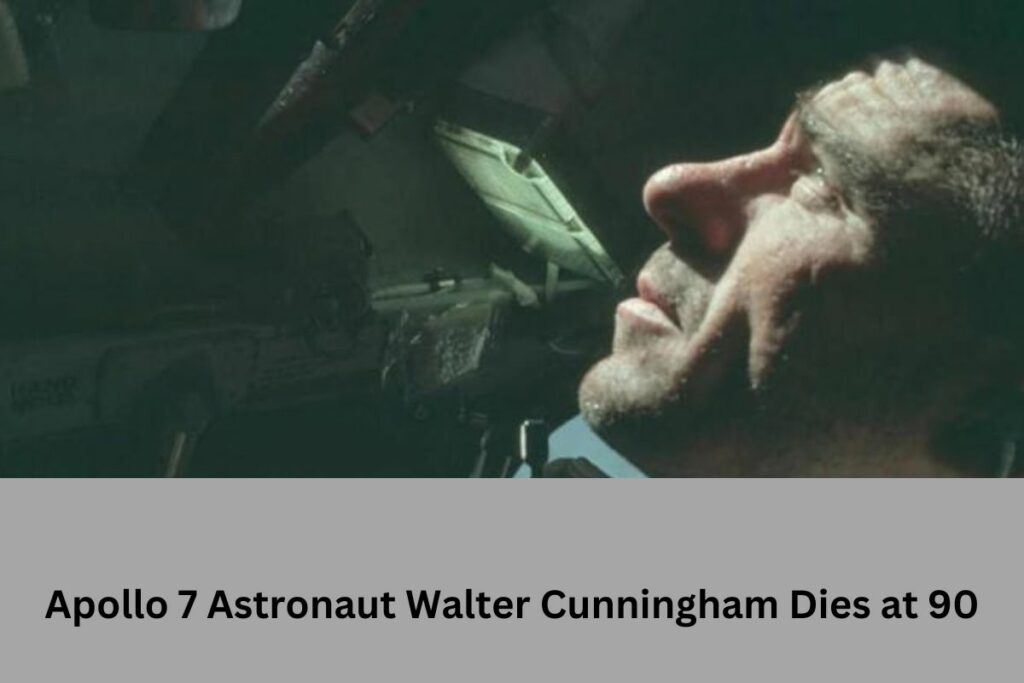Walter Cunningham, the last living astronaut from NASA’s Apollo program’s first successful crewed space mission, died Tuesday in Houston. He was 90. Walter Cunningham, an Apollo 7 astronaut, died at the age of 90.
In a statement, NASA acknowledged Cunningham’s death but did not specify the cause. Cunningham died in a hospital “from effects of a fall, after a long and complete life,” according to his family’s spokesman, Jeff Carr. Now in Rohtak: This is how you may earn a second income for $249.
Cunningham, then a civilian, flew the trip with Navy Capt. Walter M. Schirra and Air Force Major Donn F. Eisele. Cunningham piloted the lunar module on the space voyage, which took off from Florida’s Cape Kennedy Air Force Station on Oct. 11 and splashed down in the Atlantic Ocean south of Bermuda.
Cunningham, Eisele, and Schirra’ flew a near-perfect mission, according to NASA. Their spacecraft worked so well that NASA dispatched the next crew, Apollo 8, to orbit the moon as a practice run for the Apollo 11 moon landing in July 1969.
You May Be Interested In:
- After Being Re-elected, What Will Newsom Do?
- Mastriano, a Trump Supporter, Has Conceded the Governorship of Pennsylvania
Cunningham, according to NASA Administrator Bill Nelson, was “above all” an explorer whose work lay the groundwork for the agency’s new Artemis lunar program. The Apollo 7 astronauts also received a special Emmy award for their daily televised updates from orbit, during which they clowned around, held up funny placards, and taught the public about space travel.
It was NASA’s first crewed space mission since the three Apollo 1 astronauts died in a launch pad fire on January 27, 1967. During a 2017 event at the Kennedy Space Center, Cunningham recalled Apollo 7, saying it “allowed us to overcome all the challenges we had after the Apollo 1 fire, and it became the longest, most successful test flight of any flying machine ever.”
According to NASA, Cunningham was born in Creston, Iowa, and attended high school in California before joining the Navy in 1951 and serving in the Marine Corps. pilot in Korea. Later, he earned bachelor’s and master’s degrees in physics from the University of California, Los Angeles, where he also earned a doctorate, and worked as a scientist for the Rand Corporation before joining NASA.
Cunningham described growing up impoverished and dreaming of flying planes rather than spacecraft in an interview a year before his death. “When I was growing up, we had no idea there were astronauts,” Cunningham told The Spokesman-Review.
Cunningham worked in engineering, business, and investing after leaving NASA in 1971, and he also became a public speaker and radio personality. “The All-American Boys,” a biography about his career and time as an astronaut, was written by him.
In his later years, he also expressed pessimism about human activity’s role in climate change, defying scientific consensus in writing and public talks while admitting that he was not a climate expert. Despite the fact that Cunningham never crewed another space mission after Apollo 7, he remained an advocate for space exploration.
“I think that people need to continue growing and pushing out the levels at which they’re surviving in space,” he told the Spokane, Washington, newspaper last year. Cunningham’s wife Dot, sister Cathy Cunningham, and children Brian and Kimberly survive him. Cunningham’s family said in a statement that “the world has lost another true hero, and we will mourn him sincerely.”

